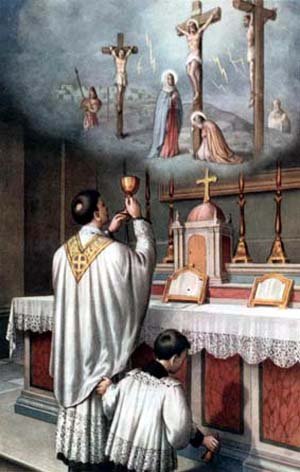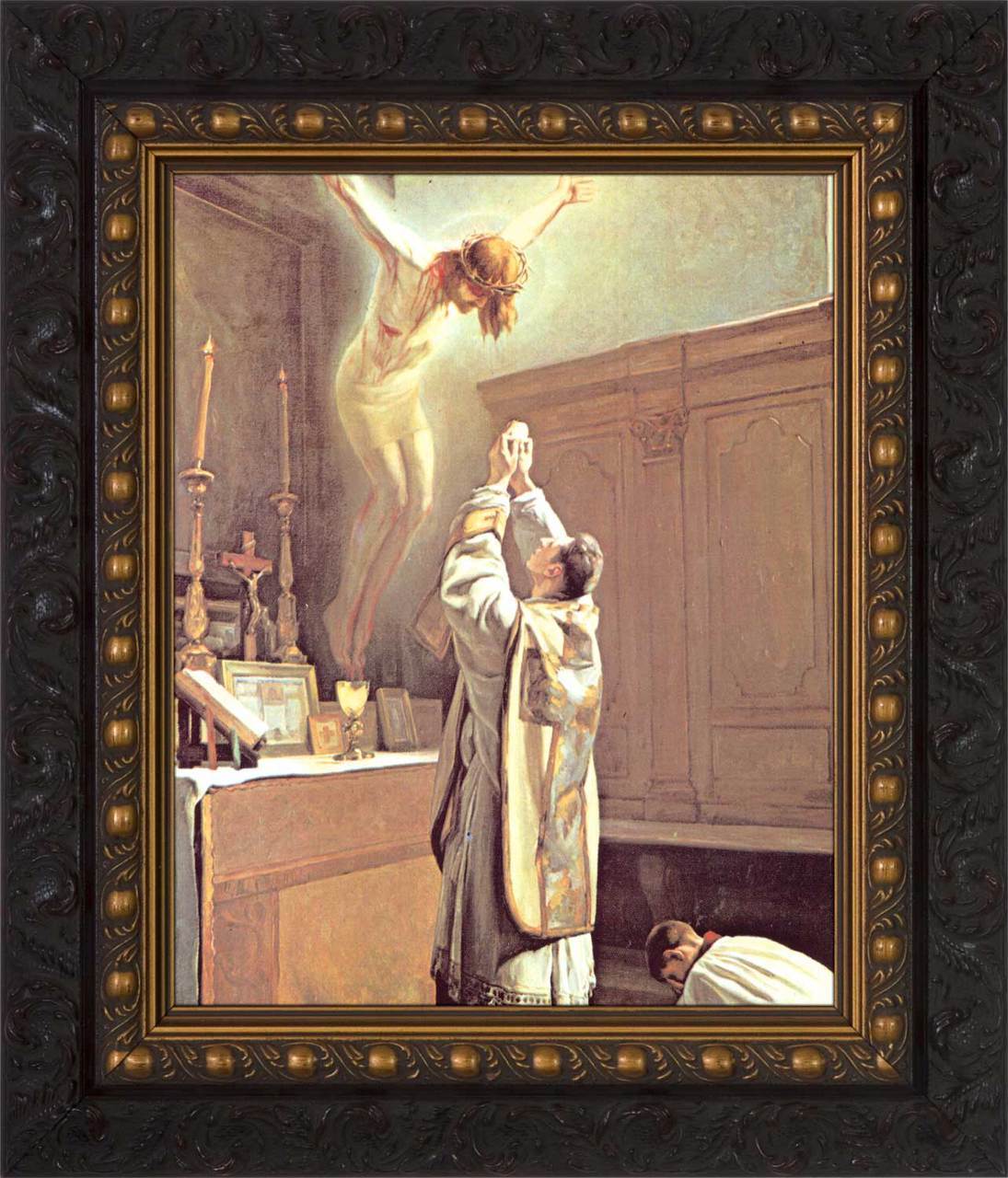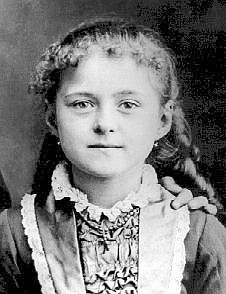All excerpts from The Holy Eucharist by Saint Alphonsus Ligouri and 20 Holy Hours by Fr. Mateo Crawley-Boevey, SS.CC.
Stay me up with flowers, compass me about with apples, because I languish with love. - Cant. ii.5
How much Jesus Christ deserves to be Loved by us, on Account of the Love He has shown us in Instituting the Most Holy Sacrament of the Altar
“You envy,” said St. John Chrysostom, “the opportunity of the woman who touched the vestments of Jesus, of the sinful woman who washed His feet with her tears, of the women of Galilee who had the happiness of following Him in His pilgrimages, of the Apostles and disciples who conversed with Him familiarly, of the people of the time who listened to the words of grace and salvation which came forth from His lips. You call happy those who saw Him … But, come to the altar and you will see Him, you will touch Him, you will give to Him holy kisses, you will wash Him with your tears, you will carry Him within you like Mary Most Holy.” Thus Jesus is truly with us.
“Jesus is there!” The holy Cure of Ars could not finish repeating these three words without shedding tears. And St. Peter Julian Eymard exclaimed with joyful fervour, “There Jesus is! Therefore all of us should go visit Him!”
Jesus, knowing that His hour was come, that He should pass out of this world to the Father: having loved His own ... He loved them unto the end. - John, xiii. I.
Our most loving Saviour, knowing that his hour was now come for leaving this earth, desired, before he went to die for us, to leave us the greatest possible mark of his love; and this was the gift of the most Holy Sacrament.
St. Bernadine of Sienna remarks that men remember more continually and love more tenderly the signs of love which are shown to them in the hour of death. Hence it is the custom that friends, when about to die, leave to those persons whom they have loved some gift, such as a garment or a ring, as a memorial of their affection. But what hast Thou, O my Jesus, left us, when quitting this world, in memory of Thy love? Not, indeed, a garment or a ring, but Thine own body, Thy blood, Thy soul, Thy divinity, Thy whole self, without reserve. "He gave thee all," says St. John Chrysostom; "He left nothing for himself."
The Council of Trent says, that in this gift of the Eucharist Jesus Christ desired, as it were, to pour forth all the riches of the love he had for men. And the Apostle observes, that Jesus desired to bestow this gift upon men on the very night itself when they were planning his death: The same night in which He was betrayed, He took bread; and giving thanks, broke and said: Take ye, and eat: this is My Body. - 1 Cor. xi.23. St. Bernadine of Sienna says that Jesus Christ, burning with love for us, and not content with being prepared to give his life for us, was constrained by the excess of his love to work a greater work before he died; and this was to give his own body for our food.
This Sacrament, therefore was rightly named by St. Thomas, "the Sacrament of love, the pledge of love." Sacrament of love; for love was the only motive which induced Jesus Christ to give us in it his whole self. Pledge of love; so that if we had ever doubted his love, we should have in this sacrament a pledge of it: as if our Redeemer, in leaving us this gift, had said: O souls, if you ever doubt my love, behold, I leave you myself in this Sacrament: with such a pledge, you can never any more doubt that I love you, and love you to excess. But more, St. Bernard calls this sacrament, "Amor amorum" (the love of loves) becuase this gift comprehends all other gifts bestowed upon us by our Lord, - creation, redemption, predestination to glory; so that the Eucharist is not only a pledge of the love of Jesus Christ, but of paradise, which he desires also to give us.
And oh, with what desire does Jesus Christ pant to come into our souls in the Holy Communion! Desiderio desideravi hoc pascha manducare vobiscum - Luke, xxii. 15. With what desire I have desired to eat this pasch with you before I suffer. So He spoke on that night in which He instituted this sacrament of love. Desiderio desideravi, so did the excessive love which he bore us cause him to speak, as St. Laurence Justinian remarks: "These are the words of most burning love."
And in order that every one might easily receive Him, He desired to leave Himself under the appearance of bread; for if He had left Himself under the appearance of some rare or very costly food, the poor would have been deprived of Him; but no, Jesus would hide Himself under the form of bread, which costs but little, and can be found everywhere, in order that all in every country might be able to receive Him.
But why is it that Jesus Christ so desires that we should receive Him in the Holy Communion? Here is the reason. St. Denis says that love always sighs after and tends to union, and so also says St. Thomas Aquinas, "Lovers desire of two to become one."
In Holy Communion, Jesus unites Himself to the soul and the soul to Jesus; and this is not a union of mere affection, but it is a true and real union.
O how delighted is Jesus Christ to be united with our souls! He one day said to his beloved servant, Margaret of Ypres, after Communion, "See, my daughter, the beautiful union that exists between me and thee: come, then, love me; and let us remain ever united in love, and let us never separate again."
St. John Chrysostom says that the most Holy Sacrament is a burning fire; so that when we leave the altar we breathe forth flames of love, which make us objects of terror to hell. The spouse of the Canticles says: He brought me into the cellar of wine, He set in order charity in me. - Cant. ii.4. St. Gregory of Nyssa says that Communion is precisely this cellar of wine, in which the soul becomes so inebriated with divine love, that it forgets and loses sight of creatures; and this is that languishing with love of which the spouse again speaks: Stay me up with flowers, compass me about with apples, because I languish with love. - Cant. ii.5.
Our Lord said once to St. Matilda: "When you go to Communion, desire all the love which a soul has ever had for me, and I will receive your love according to your desire."
Affections and Prayers
O God of love, O infinite lover, worthy of infinite love, tell me what more canst Thou invent to make us love Thee? It was not sufficient for Thee to become man, and to subject Thy self to all our miseries; not sufficient to shed all Thy blood for us in torments, and then to die overwhelmed with sorrow, upon a cross destined for the most shameful malefactors. Thou didst, at last, oblige Thyself to be hidden under the species of bread and wine, to become our food, and so united with each one of us. Tell me, I repeat, what more canst Thou invent to make Thyself loved by us? Ah, wretched shall we be if we do not love Thee in this life! And when we shall have entered into eternity, what remorse shall we not feel for not having loved Thee! My Jesus, I will not die without loving Thee, and loving Thee exceedingly! I am heartily sorry, and am pained for having so greatly offended Thee. But now I love Thee above all things. I love Thee more than myself, and I consecrate to Thee all my affections. Do Thou, who inspirest me with this desire, give me also grace to accomplish it. My Jesus, my Jesus, I desire nothing of Thee but Thyself. Now that Thou hast drawn me to Thy love, I leave all, I renounce all, and I bind myself to Thee: Thou alone art sufficient for me.
O Mary, Mother of God, pray to Jesus for me, and make me a saint! Add this also to the many wonders thou hast done in changing sinners into saints.
My Good, my God, all mine Thou art;
Myself I give Thee, all my heart;
For Thee, and Thee alone, I sigh.
What have I in heaven? and besides Thee, what do I deisre upon earth? Thou art the God of my heart, and the God that is my portion forever. - Ps. lxxii. 25,26.
Quid enim mihi est in caelo? et a Te quid volui super terram? Deus cordis mei, et pars mea Deus in aeternum
Jesus in the Holy Eucharist, a contemplation
Jesus: Beloved soul, here in the Host where you see Me, I live silent, mute, perpetually bound before the modern Herods. Do you not hear, rising to Heaven, the insolent questioning which they make Me undergo, I Who am sovereign Power, Truth, and the sole Master of the world? I keep silence for love of you, for you whom I save by enduing the ignominious condemnation of the rulers of the world, judges of men but never of My doctrine. They seek authority and use it against Me, so you see Me the perpetual victim of their abuse of power. For them, thrones; for Me, the prisoner's bench; for them, the golden sceptre; for Me, always the reed of mockery; for them, a retinue which applauds and flatters them; for Me, jeering cohorts and executioners; for them, diadems and homage; for Me, the crown of thorns; for Me, forgetfulness, always forgetfulness!
And if at times in spite of themselves, these worldly powers evoke the remembrance of My Sovereignty, My Name alone is enough to cause a tempest of hatred, of legal persecution, and of blasphemy to break forth. Thus am I judged and condemned by the world which lives only by Me. I keep silence because in the Holy Eucharist I am the incarnation of a merciful love. But this revolt against My Sovereignty, this ignoring of My rights in the laws which rule nations is a direct insult against Me the Almighty Who dwells among men, reduced to seeming helplessness in the Sacrament of Love.
Is not this wrong, a real defiance of the Eucharistic God? Is this not an insul to Him Who speaks to you from the depths of His Tabernacle which often indeed becomes Pilate's Praetorium? Here, meek and humble, I bear the affronts of ruffians nad the contempt of the vilest men. I am taken out of this prison only when earthly tribunals order Me to be scourged, and then to be shown, covered with blood, to the angry mob.
O how consoled My Divine Heart feels by your reparation! The ardent love of My friends makes up for the scoffing of the powerful. You who are rich make reparation for these insults by your humility; you who are poor, by your resignation. From here, from My Tabernacle, I bless you, My very faithful friends. Speak, then, My children. You, the elect of My Heart, ask for miracles. Speak, I am the King of infinite mercy.
Jesus: See Me covered with wounds: My hands which beckon and bless are transpierced. My feet are lacerated. My brow bruised, My lips livid, My eyes blinded by Blood, My side opened by a deep wound. How men shudder at the sight of a God, bloodstained and crushed by sorrow, men who would have the delights of an anticipated Paradise in this land of exile. My love for you has brought Me to this condition. In the Tabernacle I expiate the thirst for pleasure and amusement that devours the modern world. ...
And I, your Jesus, I am held chained by love, I remain alone in My Tabernacle by the good, denied by the weak, forgotten by the greater number, condemned by unworthy rulers and scourged by the mobs raised up against Me. I loved My own above all things, even unto death, and those of My household preferred dust, the mire of the road, to Me.
Consider and see, you My friends, if there be a sorrow greater and like unto My sorrow!
To Jesus:
What have I, Lord Jesus, that Thou hast not given me?
What do I know, that Thou hast not taught me?
What can I do, if Thou dost not help me?
What am I, if not united to Thee?
Pardon, O pardon my faults that have so wounded Thee!
Thou hast created me without any merit of mine.
Thou hast redeemed me without my cooperation.
Thou hast done much in creating me,
And still more in redeeming me.
Wilt Thou be less powerful or less generous in forgiving
me?
For all the Blood Thou hast shed and the cruel death Thou hast
suffere.
Were not for the profit of the Angels who adore Thee,
But to my benefit and that of the sinners who implore Thee.
If I have then denied Thee, let me praise Thee,
If I have outraged Thee, let me love Thee,
If I have offended Thee, let me serve Thee.
For to live without loving Thee,
And to love without suffering for Thee,
O Jesus, that would be death without Thee.
O Esca Viatorum!
(for the midi file click
here)

Jesus, Mary, I love Thee; Save Souls!
Jesu mitis et humilis corde, Fac cor nostrum secundum Cor tuum. (ter)
Labels: 20 Holy Hours by Fr Mateo Crawley-Boevey, THe Holy Eucharist by St. Alphonsus Maria de Ligouri
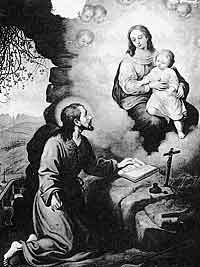

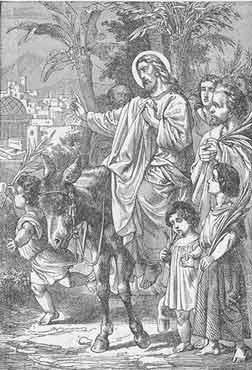


 Je l'avise et Il m'avise!
Je l'avise et Il m'avise!













